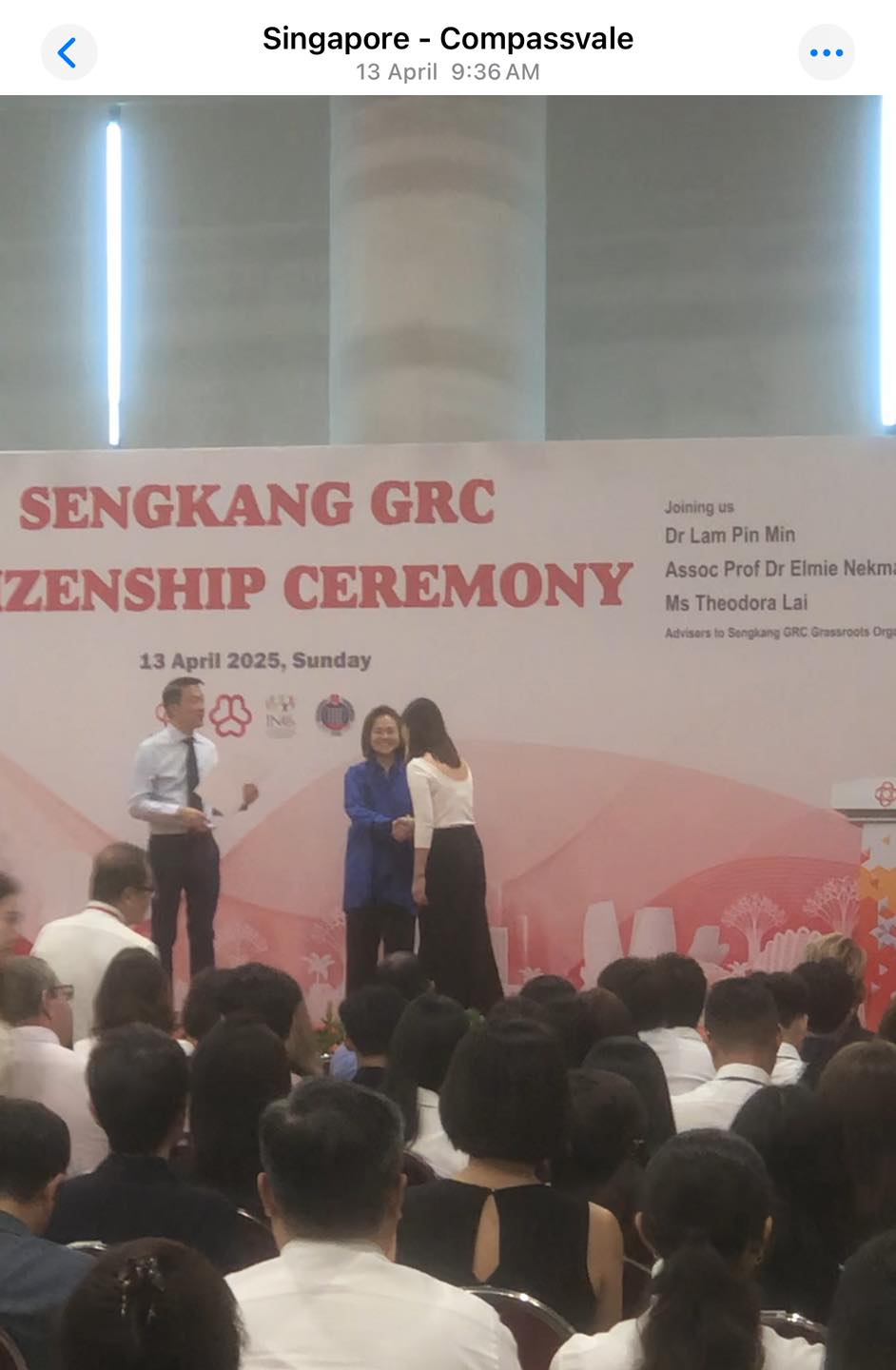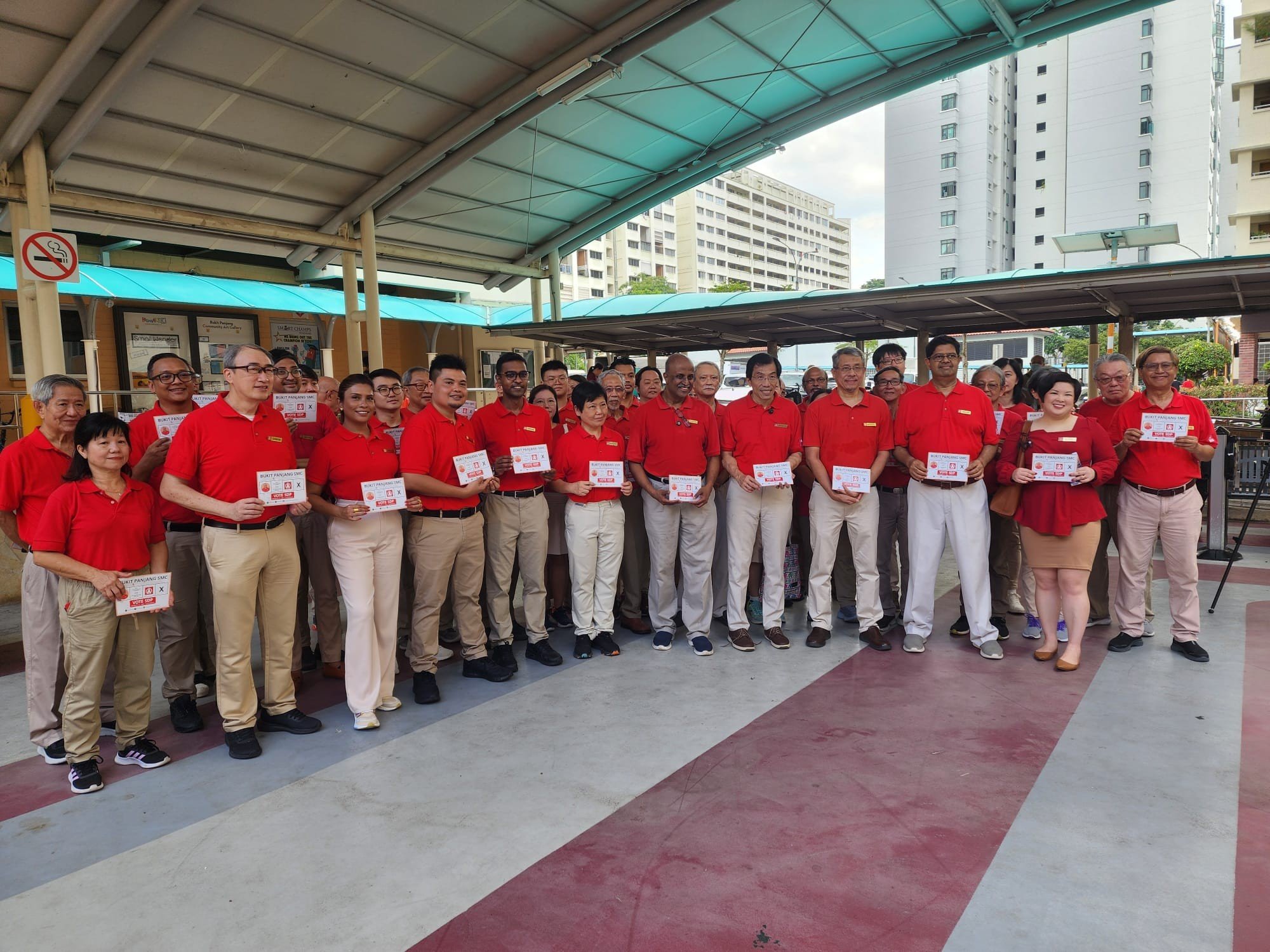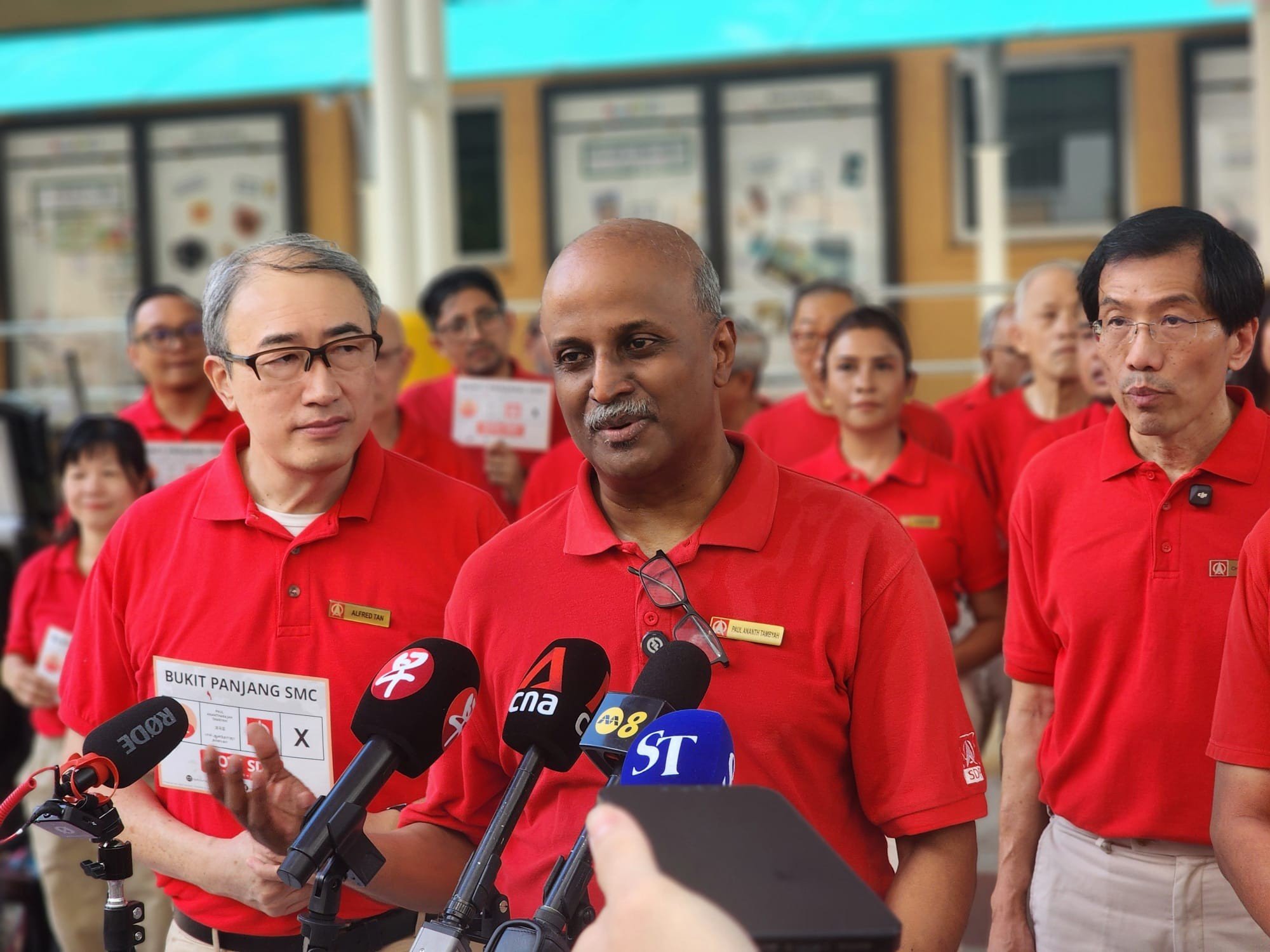SINGAPORE: Red Dot United (RDU) has unveiled its A-team to contest in Nee Soon GRC—a constituency currently held by Law and Home Affairs Minister K. Shanmugam, and long considered one of the ruling party’s strongholds.
In a bold declaration, RDU Secretary-General Ravi Philemon, who will be leading the charge in Nee Soon, described the upcoming clash as the political equivalent of “Liverpool vs Manchester United”—a high-stakes, high-energy battle.
“Everyone in Red Dot United has a role to play,” Ravi said. “But in Nee Soon GRC, we’re fielding formidable players.”
The party made its announcement on Sunday (April 20) at Block 701C Yishun Avenue 5, a symbolic choice located right in the heart of Nee Soon GRC.
So what message does RDU have for the residents of Nee Soon—and who exactly are the candidates in this star-studded lineup set to take on the yet-to-be-announced PAP team?
A war-cry for transparency
In a rousing address that pulled no punches, Red Dot United (RDU) Secretary-General Ravi Philemon delivered what can only be described as a war cry for transparency at the announcement of the party’s candidates for Nee Soon GRC. Framed against the backdrop of growing concerns around government accountability and the future of Singapore’s energy policy, Philemon’s speech was as much a rallying call as it was a candid confession.
“The foundation of Red Dot United’s contest in Nee Soon GRC will be built on honesty,” he began, eyes steady as he addressed both the press and the people. “And I want to speak honestly today—not just to our media friends, but also to the residents of Nee Soon.”
Philemon didn’t shy away from acknowledging the emotional and political cost of contesting against the ruling People’s Action Party (PAP), calling the process “never easy.” In a political landscape where criticism of the establishment often comes with personal consequences, his remarks struck a chord.
“When you step out as an opposition against the PAP, there are always costs involved. The cause demands sacrifice, and the risks are real. Even among close friends, supporters, and sometimes even family members, you may face doubts or discouragement. But that is the kind of society we live in.”
Despite the odds, RDU has managed to assemble a star-studded slate of candidates that Philemon believes reflects both moral courage and intellectual rigour, chief among them, two scientists: Dr David and Dr Syed.
Their candidacy is deeply symbolic. RDU’s decision to contest in Nee Soon was galvanised by what the party sees as the government’s quiet persistence in exploring nuclear energy, without sufficient public consultation or transparency.
“We are not saying no to nuclear energy. That’s the difference,” Philemon clarified. “What we’re saying is: Talk to us. Have a conversation. Give us the facts. Convince us.”
His statement underscored a broader critique: that policymaking in Singapore often bypasses the people it affects most. For RDU, this election is about restoring that broken bridge between authority and accountability.
“We stepped forward because we believe Singapore deserves that transparency. That dialogue. That democracy.”
It was a bold message—one not just grounded in rhetoric, but in action. By fielding experts like Dr David and Dr Syed, who are well-versed in the very domains the government is quietly advancing, RDU is making clear they are not here to simply oppose. They’re here to inform, challenge, and propose.
“I’m proud to be joined by ethical professionals—people who care deeply about what’s at stake and who are willing to stand up for the public interest.”
For a party often painted as the underdog, this wasn’t just a speech. It was a statement of intent. A call to Singaporeans that the time for silence has passed. The time for honest conversation has come.
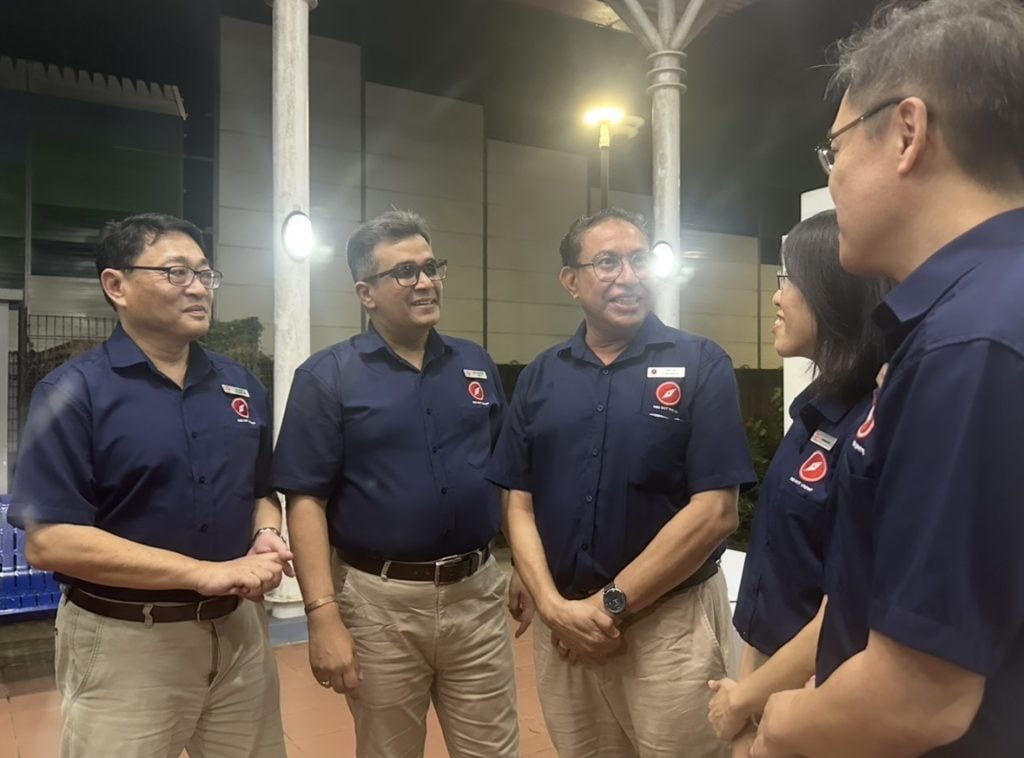
The Scientists, The Strategists, The Servants: Meet Red Dot United’s Nee Soon GRC Team
Dr David Foo: The Chemist with a Conscience
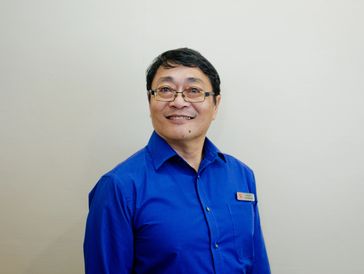
A research chemist by profession and Chairman of RDU by passion, Dr David Foo brings over three decades of scientific and civic experience to the political table. With a PhD in Chemistry from the University of Idaho and a track record in academia, government, and private enterprise, Dr Foo’s voice adds weight to RDU’s stance on transparency, especially in areas like nuclear energy policy.
“Including fairness as a value in how workers are compensated and how we address retirement adequacy isn’t just about inequality—it’s about resilience.”
He is also the co-founder of the Think Centre and a former GE2015 candidate, remembered for his clear, rational, and no-nonsense communication style. His leadership is driven by a deep belief in policies that empower, uplift, and prepare future generations for the unpredictable tides ahead.
Sharon Lin: The Technologist for the People

A daughter of Yishun and a senior IT consultant with an MBA and a background in cybersecurity and DevOps, Sharon Lin is no stranger to systems, both digital and social. Her campaign centres around one message: technology must serve people, not complicate their lives.
“Good systems serve the people. When they don’t, we must ask why — because the cost of poor governance is paid by ordinary Singaporeans.”
Having grown up in the heartlands and seen her own family grapple with financial uncertainty, Sharon’s approach is grounded in empathy. Whether it’s fixing flawed systems like SimplyGo or calling out inefficiencies in public spending, her mission is clear: build fair, people-first policies that listen.
Dr Syed Alwi Ahmad: The Physicist Who Sees the People

Dr Syed Alwi Ahmad, or simply Dr Alwi, is a theoretical physicist who has traded quantum fields for community fields. With a PhD in Physics from Virginia Tech and publications on black holes and quantum theory, he brings rare intellectual depth to politics.
But it’s not theory that drives him—it’s people.
“To truly understand what people are going through, you need both a microscope and a telescope — to see the fine details of daily struggle and the wide horizon of possibility.”
As head of both RDU’s Policy Team and Malay Bureau, Dr Alwi advocates for equity, not just equality. He is passionate about uplifting underrepresented communities—not out of favouritism, but as a moral imperative, rooted in our national pledge.
Pang Heng Chuan: The Business Strategist for a Changing World

With over 15 years of experience across branding, big data, and e-commerce, Pang Heng Chuan is the team’s business brain. He has led multi-million-dollar regional projects and understands what it takes to keep Singapore competitive.
“Singapore has only two natural resources — our people and our position on the map. To stay competitive, we must listen to every voice, especially the smallest ones.”
Pang believes that government policy must not just react to global trends—it must shape them. In the face of tech layoffs and economic shocks, he champions forward-thinking, inclusive strategies that empower both SMEs and workers to thrive in tomorrow’s economy.
Ravi Philemon: The Veteran with the Voice of Reason

A two-time GE candidate and RDU’s Secretary-General, Ravi Philemon is no stranger to the political frontlines. A media practitioner, father, and grandfather, Ravi carries the concerns of everyday Singaporeans not just in his rhetoric, but in his lived experience.
“I know what it means to worry about your children’s future, and your grandchildren’s tomorrow. That same love, that same fight — I now extend to every family in this country.”
Known for his calm, constructive style and unwavering integrity, Ravi has spent nearly two decades pushing for fairness and dignity in Singapore. His leadership is not performative—it’s personal.
Together, this team of five isn’t here to perform opposition for opposition’s sake. They’re here to lead with thought, heart, and vision. As Singaporeans prepare to head to the polls, Red Dot United’s Nee Soon GRC slate is making one thing clear:
The future is worth fighting for—and transparency is where it begins.
Stay tuned as The Independent continues to bring you unfiltered coverage of GE2025 — the candidates, the contests, and the convictions shaping Singapore’s future.








